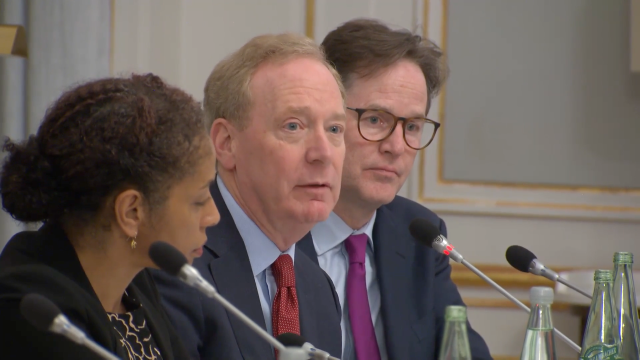Major tech companies announced a new pact at the Munich Security Conference on Friday pledging to fight AI-generated fakes that are intended to deceive the public and influence elections. The press conference, which was livestreamed online, featured leaders from Big Tech firms who’ve been under immense pressure in recent years to address the misinformation that’s proliferated online as it becomes easier to literally put words in someone else’s mouth.
The signatories of the pact included a who’s who of the tech industry, including Adobe, Amazon, Google, IBM, Meta, Microsoft, TikTok, and X. Notably, AI companies were also among the companies pledging to fight AI fakery, including ElevenLabs, Stability AI, and OpenAI.
While it’s easy to understand the potential problems posed by AI during an election season, the solutions are much harder to come by. And that really shines through in today’s official news release by the tech companies, which is filled with phrases that sound pleasant without giving too many specifics, like “fostering cross-industry resilience” and “implementing technology to mitigate risks.”
The new pact is entirely symbolic, but the fact that it includes just about every major consumer-facing tech company certainly demonstrates just how serious they consider the issue. At the same time, those same CEOs clearly understand the concerns around free speech in an era when claims of censorship from Big Tech have become a political football.
“This is not about substituting the views of one or any number of tech companies for the right of people to stand up and say what they believe,” Microsoft’s Brad Smith said at Friday’s press conference, according to a livestream of the event.
“But the right of free expression does not put one person in a position to put their words in someone else’s mouth in a way that deceives the public by making it appear that someone used words they never uttered or went somewhere they never went,” Smith continued.
And while that might sound possibly true, the First Amendment would probably disagree with Smith. The U.S. tradition of free speech gives wide latitude for people to ridicule public figures with parodies and even deepfakes. The area where people could get into legal trouble would be in a conspiracy to deprive others of their rights, like in the case where a far-right troll created photoshopped images targeting Hillary Clinton voters in 2016 urging them to vote by text, something that’s not possible. The U.S. Department of Justice charged that man last year who now faces up to 10 years in prison.
But the battle against deepfakes largely brings Republicans and Democrats together. Sen. Lindsey Graham, a Republican from South Carolina, and Sen. Mark Warner, a Democrat from Virginia, released a bipartisan statement in support of the new pact.
“We believe it is imperative for technology companies to take proactive and responsible steps to address the growing risk of AI-enabled content in our elections,” the senators said in a joint statement praising the new initiative.
“We support the voluntary commitments the tech sector is taking through the Tech Accord to Combat Deceptive Use of AI in 2024 Elections, but will continue to hold the industry accountable,” the statement continued.
The AI Elections Accord, which has its own website, will obviously generate the most attention for this November’s upcoming presidential election. But these are all global companies operating in virtually every country around the world. And the U.S. isn’t the only country trying to grapple with the rise of easily generated images and videos that have the potential to swing elections. Over four billion people in 40 countries will be voting in 2024, according to the AI Elections Accord website.
“With so many major elections taking place this year, it’s vital we do what we can to prevent people being deceived by AI-generated content,” Nick Clegg, president of global affairs at Meta, said in a written statement.
“This work is bigger than any one company and will require a huge effort across industry, government and civil society. Hopefully, this accord can serve as a meaningful step from industry in meeting that challenge.”
